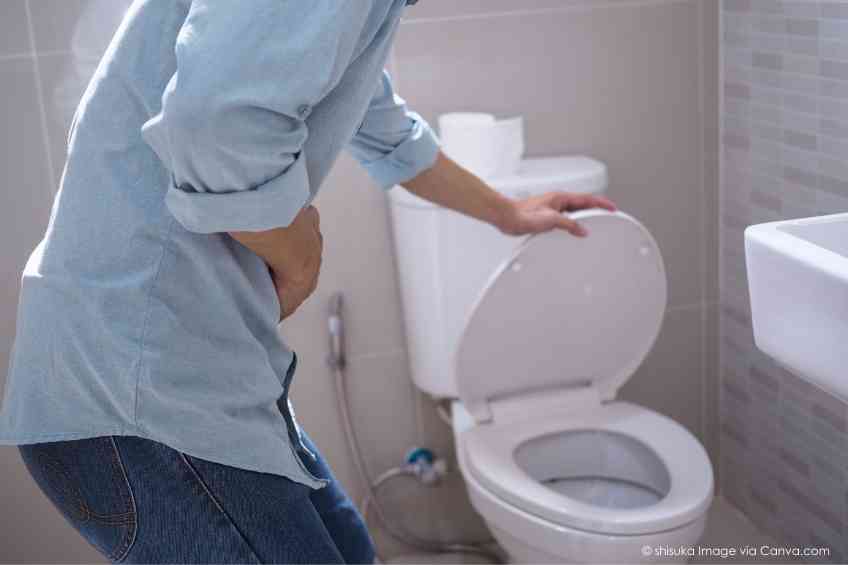Got balky bowels and are afraid to talk about it? You’re not alone. Millions of Americans are on the same page—and it is affecting their professional, personal and social lives. There are all sorts of reasons that can cause these problems and their uncomfortable symptoms—cramps, constipation, bloating, diarrhea and more. One of the prime movers is Irritable Bowel Syndrome or IBS. Untold numbers of people suffer in quiet from IBS. In reality, it’s time for them to speak up because help is available for IBS sufferers. Dr. Megan Riehl, in fact, spoke to WellWell recently on all things IBS—what causes it, how to identify it and what treatments are available to bring it under control. As the co-author of Mind Your Guy, The Science-Based Whole-Body Guide To Living Well With IBS, she’s the one to listen to. Read on.
Exactly what is IBS?
IBS is recurrent abdominal pain where you will have that pain in association with different bowel consistencies, so you may have constipation, diarrhea or you could have a mixed bag fluctuating between the two. And we look at this over three months and that’s when we start to meet the criteria and, unfortunately with this diagnosis, a lot of people live with it for a long time before they see a doctor. It’s a complex disorder where we’re learning more and more about it, but we have come so far from where we used to be. A lot of times people were told to just live with it. It’s not cancer. It’s not inflammatory bowel disease.
Is IBS considered a disease or a condition?
Well, it’s a syndrome and we think that it’s probably a combination of a lot of different things and that’s where it is important to meet with the doctor to get that diagnosis. There are a lot of what we call IBS mimickers out there like small intestinal bacterial overgrowth or SIBO or sometimes these symptoms that are similar to something like an inflammatory bowel disease, which can be Crohn’s disease or ulcerative colitis. The treatment plan is going to be very different based on what the diagnosis is and therefore it is important to talk with your doctor about all of the symptoms that you’re experiencing.
How many people are affected? Is the number growing or are we just hearing about it more?
Our number is around 45,000,000 Americans who have IBS. There’s been lots of research to identify that number. You can find the global prevalence of between 6 percent and 10 percent of the global population. So, it’s prevalent and it’s kind of fun to be in a room with 100 people to say like hey, at least 10 of you probably have this diagnosis and are living with this and coping with this and dealing with the anxieties of this. But I also believe from my own clinical experience that this is probably a conservative number and likely because a recent survey study that was done in 2023 showed one in five people with IBS do not want to discuss their symptoms with their providers and one in four people are managing their symptoms with just over the counter medications or non-medical treatments. One in four even mentioned that their symptoms were not bothersome enough to seek medical care. So, I think that this shows that there are lots of people out there who just haven’t gone to the doctor or haven’t participated in the research studies to be captured. When we think about prevalence a lot of people have just been kind of conditioned to believe they have to live this way.
Do you suspect the numbers are growing? And what’s causing it?
I do think probably the number will continue to grow for a variety of reasons. To speak to your question of what’s causing it, the pandemic certainly added lots of stress for people and this is a stress-sensitive disorder where stress can impact our gut-brain health and can lead to worsening GI symptoms or the development of symptoms. But even people that had COVID sometimes saw a worsening of GI symptoms, or that glucovance diagnosis led to some gastrointestinal conditions. So, for a variety of reasons, the prevalence could be on the rise and I think the story is unfolding here over the last four years of how our world has been impacted by the stress of the pandemic. The cause of IBS is also multifactorial. There can be environmental factors, genetic factors, stress factors and psychological factors that can lead to this diagnosis. So, I always say the road to an IBS diagnosis is very individualized. But as we do a clinical interview with patients, it’s not uncommon for them to say, growing up my mom always had a sensitive stomach or my dad and his family had a history of GI problems. But nobody ever sought treatment or nobody ever went to the doctor for it. So, I think that there could be some kind of genetic tie there that eventually draws somebody into the clinic to talk about their symptoms. But a lot of times the factors complex interactions of food in our microbiota lead to is this impaired barrier function in your immune activation. This means the way the brain and the gut are communicating is dysregulated, and our goal with treatment is to try and restore it. But how we do that can include a variety of multidisciplinary strategies.
Is there a difference between the causes and the triggers of IBS? If you eat something or something happens all of a sudden, will you have this avalanche of symptoms?
I have a podcast called The Gut Health Podcast and we just had as a guest one of the leading experts in terms of IBS and small intestinal bacterial overgrowth, Dr. Mark Pimentel. He highlighted that people can go on vacation or they can go on to a wedding and find out that a bunch of people got food poisoning or they had a couple of hours of diarrhea while they were on vacation and you kind of move on and you don’t think about it. And then three months later, you’ve started to have IBS symptoms. So, it can be as unfortunate as that where just a few hours of exposure to something in your food can then change the functioning of your microbiota and lead to an IBS diagnosis that they’re dealing with for essentially the rest of their life. I can also use psychological stress as another example where we know that people who have an IBS diagnosis have a higher prevalence of a history of trauma and so people will sometimes show up in my clinic and say yes, I had a history of trauma, but I processed that. I dealt with that like I didn’t have GI issues as a kid when I was dealing with all of that. It just highlights the intricate nature of the way our body is and how our brain and our gut are so bidirectionally tied and that can lead us to unfortunately this diagnosis.
It sounds like it’s a difficult issue to deal with, from a clinical standpoint and from the patient perspective.
The thing about it is that you can’t predict necessarily when you’re going to go to the bathroom too frequently or if you’re struggling to go. IBS with diarrhea-predominant symptoms, these patients experience abdominal pain. And then frequent diarrhea that again a lot of times they tie to the food that they’re eating or stress can send them to the bathroom. And then it’s really hard to get out and that then makes it difficult to get to school, to get to work, to think about dating or being intimate. These aren’t symptoms that we tend to talk about at a cocktail party. Although I think we are normalizing it a bit more. I have little kids and we talk all the time about everybody poops and I want to know if you’re not pooping, I want to know if you’re pooping too much because I’ve had so many patients that get to my office and they’re in their 30s, 40s, 50s and they’re like ‘we never talked about going to the bathroom in our household. In fact, it was taboo.’ Nobody wanted to know about it. And so, they didn’t learn as children that going 5-6-7 days without going to the bathroom wasn’t normal. I think we do have to normalize it. Every kindergartener should really have a conversation about how they are pooping, proper pooping positions, how frequently they should be going and that it’s not normal to have a tummy ache every day because that’s what then leads to the perpetuation of some of these symptoms later in life.
And more women than men will have IBS with constipation. Women are 2.5 times more likely than men to have IBS. But when we look at the prevalence types, women are more likely to have constipation. And with that comes not only abdominal pain but bloating and distension, which is very uncomfortable on top of not being able to pass stool. And that then impacts appetite, it impacts the pelvic floor and we also see that those symptoms can be worsened during the menstrual cycle. So, to not address any of this and to just kind of feel like you have to live with it is just like my nightmare. I want people to know that we do have ways to address it. It’s just a matter of whether you may have to think outside of the box if you haven’t made progress by working with only a medical doctor.
There are millions of people walking around with IBS who probably don’t know that they have IBS.
There’s certainly still a lot of stigma around this diagnosis. Part of my motivation and passion as an educator in this space is to talk more about it, to let people know that if you’ve tried medications on and off for the last 20 years and it just hasn’t worked, the good news is that working with a registered dietitian or with a GI psychologist like myself can be beneficial. There are other ways that we can address this diagnosis that haven’t historically been available and around for all that long. One thing you can do is Google the Bristol Stool chart and this is a chart of poop. There are types one to seven and up. The number one is going to be a stool that’s almost pebble-like so hard to pass pebbly stool. This is going to be constipation. And from there, it progresses to a number seven, which would be watery diarrhea like the worst watery loose diarrhea. And then in between there is a number four where stool is like a smooth snake that comes out easily. That’s ideal. Color can be used to identify concerning stool as well. Most of us eat different things. And so, your stool won’t always be brown. Like if you’ve had too much processed food coloring, then that also can change the color of your poop. But generally speaking, being mindful of the color of your stool can be something to report to your doctor and your doctor will know what you are talking about if you tell them I’m a type one on the Bristol Stool chart or I’m a type seven and so your diarrhea, you’re constipation, fluctuating between the both are all symptoms to watch for along with that abdominal pain, cramping and bloating. There’s a lot of overlap in terms of pelvic floor dysfunction in this patient population. Sometimes patients with IBS will have what’s called Dyssynergia Defecation. This means that the functioning of the muscles needed to pass stool is not where we need it to be, and so working with a pelvic floor physical therapist can help strategically strengthen those muscles and teach more about the mechanics of how you’re pooping.
Can anxiety or depression make IBS worse?
The link between the GI tract and our brain is bidirectional. The chemicals in our brain that can be produced related to anxiety or depression can impact our GI tract, but also the chemicals in our GI tract can impact our brain and worsen symptoms of anxiety and depression. We also see very GI-specific anxieties in patients suffering from IBS. For example, people are avoiding social situations because they’re afraid of not having access to a bathroom or maybe having a fecal accident. Fecal incontinence with IBS is typically not a common symptom unless you have pelvic floor dysfunction. And those muscles aren’t coordinating to be able to hold the stool until it’s the right time to evacuate, so if you’re having a lot of bouts of fecal incontinence and you think you have IBS, you want to be talking to your medical provider about that. So anxiety that’s related to the GI symptoms, things that we work on in behavioral therapy, are addressing avoidant behaviors, helping to manage some of the catastrophic thoughts that we might have of like ‘oh, if I pass gas or if my stomach gurgles and I’m in a classroom or in a boardroom, I’m just going to be too mortified and people are going to think I’m gross. People are going to think that there’s something wrong with me. So, I’m just going to avoid those situations.’ We want to address those GI-specific worries, anxieties and stressors from a behavioral perspective.
Do we know why women are more affected by IBS than men?
The reality is that women are affected more probably because of hormonal reasons and they are more likely to go to their doctor for care. I know that sometimes my husband will be complaining of symptoms and I’m like ‘Go to the doctor’ and he’s like ‘No, no, no.’ And then a year later, the same symptoms persisted and I emphasized ‘Go to the doctor.’ And finally, ‘Oh, yeah. Maybe I’ll go.’ So, I think the hormonal component is a piece that makes this more prevalent in women. But that being said, it’s still heavily impacting men as well. We need to continue to learn more about this and unfortunately the research shows that women then have a lower quality of life compared to men when they both have IBS. Women who have more fatigue, are more likely to have depressed moods and higher levels of anxiety. So, I think we have to do a better job in our research to nail down more reasons why women are more heavily affected and we need research dollars for that.
Are there additional dangers tied to IBS that people may not realize?
From a medical perspective, you’re not really at risk for anything outside of just low quality of life especially those that have comorbid anxiety or depression. We don’t want your depression to progress so far that you’re feeling so hopeless that you experience suicidal ideation. And we see that with these patients. So, I do think there’s a psychological risk for people who don’t have the right treatment plan in place.
With the growing awareness of IBS, are general medical practitioners more aware of dealing with it, and has that grown over the last 10 or 15 years?
This is an evolving field where a primary care doctor can typically manage IBS pretty well and they’re likely to use treatment plans based on the symptoms that the patient is having. So, if they have diarrhea, they’re probably going to recommend an antidiarrheal medicine. If they have constipation, they’re going to work on a laxative treatment. And the medications have become more sophisticated over the years. However, it’s typically unless you’re one of the lucky patients where medication doesn’t manage your symptoms and so there is a growing recognition that the gold standard care for IBS at this point is an integrative, multidisciplinary perspective that includes not just a primary care doctor or a gastroenterologist, but a dietician, psychologist and potentially a pelvic floor physical therapist. We talked about this as creating your dream team in our book and access to that, though is still quite limited. At the University of Michigan, we have all of that and we can get patients access to a wide range of sub-specialists for those who don’t have a fully integrated GI psychologist. I think the good news is digital therapeutics are emerging and that can be something that a local gastroenterologist or primary care doctor can refer to. Such as a gut-directed hypnotherapy app or there are therapeutics out there that are doing GI-specific cognitive behavioral therapy. And then the field of GI Nutrition is also really growing. So, it’s probably easier to find a GI dietician who specializes in the variety of dietary and nutritional therapies that are recommended for IBS. I think as stigma reduces with IBS and more of these kinds of multidisciplinary approaches become available, people are going to be more likely to talk about them in their clinics.
Is the treatment able to eliminate IBS as a disorder, or does it just control it?
If you Google IBS, you will find a lot of snake oil out there and what I mean by that is any product or program that says that they’re going to cure your IBS. They either are unintentionally using the wrong word or they’re making a blanket statement that science has not allowed us to say it’s possible. So, the goal with treatment is that we’re able to reduce the severity of your symptoms, reduce how frequently you have symptoms, and reduce how you are experiencing that severity, frequency and duration. Maybe you have a couple hours of abdominal pain you’ve had a bout of diarrhea or you feel like you have to go and you can’t. However, instead of getting super anxious about that and further eating more foods that might exacerbate your symptoms, our goal with treatment is to empower you with a whole toolbox of strategies that you’ll turn to so that the symptoms are far more impactful on your quality of life. A lot of times people will avoid food for way too long in an attempt to manage their symptoms, but the body needs to keep some food in. So, whether it be as gentle as some chicken broth or something very easy that works for your stomach, it’s important to keep kind of hydrated and get food into your system. You could also practice relaxation interventions. These are some of the behavioral strategies that I specialize in to help calm and soothe and restore the way the brain and the gut communicate.
How does your book Mind Your Gut help people live well with IBS?
I co-wrote the book with a world-renowned GI dietician Kate Scarlata. It’s the first of its kind to help you understand the IBS diagnosis. We reviewed the pathophysiology, which is the mechanics of IBS, and a unique road map that each individual with IBS might fall into to land at an IBS diagnosis. And then from there, we have several chapters dedicated to reviewing nutrition where Kate highlights the evidence, the science not just for the Low Fodmap Diet, which is an evidence-based nutrition therapy for IBS. However, we highlight that not everybody needs to follow a restrictive diet to manage their IBS. Maybe they could benefit from following some of our suggestions for a gentle diet clean-up, which again falls into which foods are easy on your stomach. We list out foods to give you lots of different options along with recipes to help you have a healthy gut, a diverse microbiome that’s so important for all of us. My chapters cover behavioral strategies that you can implement from home. So different relaxation strategies. I give an overview of stress management interventions that can be helpful not only for your IBS but also for all of us who have stress and we can all benefit from some good strategies there. And then I dive into some of the science related to the benefits of using gut-directed relaxation, which stems from the world of gut-directed therapy. We also have several chapters that talk about very symptom-specific strategies. We cover the science of medications, probiotics and prebiotics and we give you our thoughts and opinions as well as what the literature says. The very end of the book is filled with lots of different resources like some of those digital therapeutics that are available on the market that can be helpful from a behavioral strategy.
What are the biggest misconceptions out there about IBS?
I think one is that you just have to live with it and that if you’ve tried a couple of different medications and you haven’t had relief there’s nothing out there that’s going to work for you. I think a lot of times people turn to probiotics and prebiotics. Those are things that potentially could work, but the science doesn’t support them at this particular time. In fact, the major guidelines for gastroenterology don’t recommend the use of probiotics because everybody’s microbiome is so different. I think that there are great natural ways that you can also address your microbiome with natural prebiotics and probiotics from food. That’s one area that you can look at and then also take a look at your overall mental health. Your symptoms of diarrhea, constipation and abdominal pain are precluding you from engaging in the life that you want to have. Working with a mental health provider, who is an expert in this area of health, can give you concrete tools and strategies to help you address those feelings and symptoms. And the timeline of treatment can range from about 5 to 10 sessions and people can have a profound impact on their overall quality of life and onward. If you’re somebody who has just been living with this, then check out our book where we have a lot of different options. And don’t stop looking for a provider who will listen to you and help. Create the treatment plan that’s going to get you feeling better.
About Megan Riehl, PsyD
Dr. Megan Riehl is a prominent GI psychologist and an associate professor at the University of Michigan. She is also the clinical program director of the GI Behavioral Health program at Michigan Medicine, where she has a full-time clinical practice. Her clinical expertise spans the field of gastroenterology from patients with motility disorders like Irritable Bowel Syndrome to those with chronic gastrointestinal diseases like Inflammatory Bowel Disease and Celiac Disease. She is the host of The Gut Health Podcast and the co-author of Mind Your Gut, The Science-Based Whole-Body Guide To Living Well With IBS.
Visit The Gut Health Podcast to learn more. Mind Your Gut is available through the Hachette Book Group.














